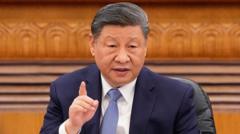The newly announced tariffs on lithium-ion batteries, predominantly imported from China, are expected to create significant obstacles for energy companies in the U.S. striving to enhance their renewable energy capabilities. This move could stifle the growth and deployment of vital energy storage technologies across the country.
Trump’s Tariffs Threaten Growth of U.S. Battery Storage Sector

Trump’s Tariffs Threaten Growth of U.S. Battery Storage Sector
Recent tariffs imposed by the Trump administration could severely hinder the burgeoning battery storage industry crucial for renewable energy expansion.
In a shift that could stymie advancements in renewable energy, the Trump administration has unveiled a series of tariffs aimed at lithium-ion batteries, a key technology used in the United States for energy storage. This announcement, made on April 3, 2025, raises concerns among energy officials that these tariffs threaten to undermine the industry's rapid expansion and deployment of grid battery technology, which has been gaining traction for its capacity to balance the electric grid powered by wind and solar energy.
Over the last five years, the demand for energy storage systems has skyrocketed, with states such as Texas and Arizona leading the way in the construction of large-scale battery storage facilities. These batteries enable energy companies to harness excess renewable energy and retain it for later consumption, thus promoting a cleaner power grid. For instance, in California, energy storage systems allow for the use of solar power during the evening hours, significantly reducing reliance on fossil fuels.
Despite its growth, the U.S. continues to rely heavily on imported batteries. Reports indicate that approximately 69 percent of these batteries were sourced from China in 2024, a statistic that has raised alarms with the imposition of a staggering 64.5 percent tariff on these imports, which is projected to increase to 82 percent in the following year. Industry experts, including Jason Burwen, vice president of policy and strategy at GridStor, have expressed deep concern, stating, “This will throttle U.S. energy storage deployment. Bad for business, bad for grid reliability.”
The U.S. Energy Information Administration previously estimated that energy companies would deploy 18,200 megawatts of battery capacity in 2025, a record amount capable of storing enough energy to power 18 large nuclear reactors for several hours. Such optimism was grounded in a broader expectation that batteries would contribute significantly to the growing reliance on solar and wind energy, which together were projected to compose 93 percent of new capacity added to the grid this year.
The landscape of energy usage in the U.S. stands on the brink of a transformation powered by giant batteries, yet the recent tariffs threaten to reverse this positive momentum, complicating companies’ efforts to meet rising energy demands while transitioning to greener technologies.





















